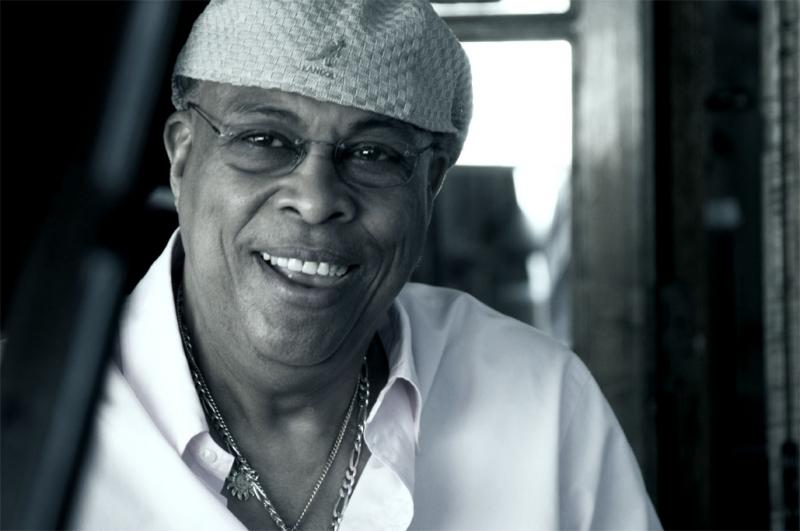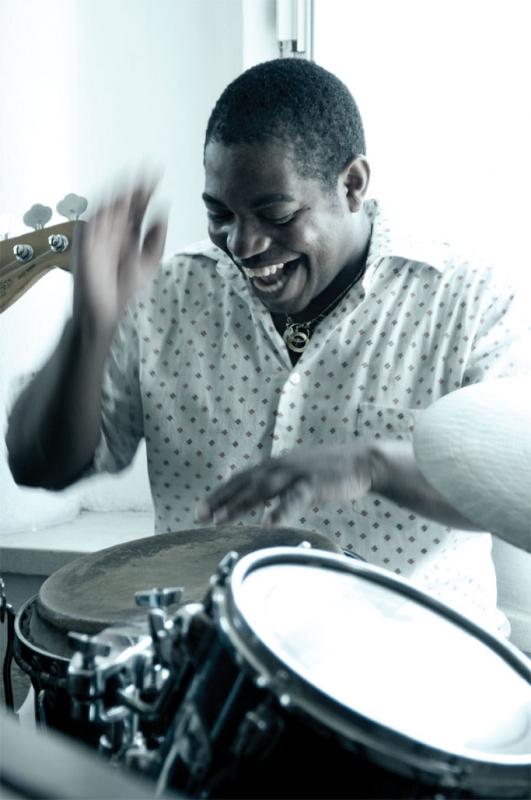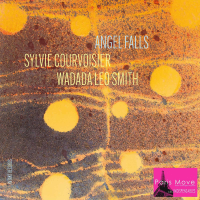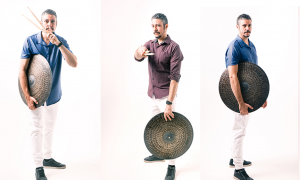Home » Jazz Articles » Interview » Chucho Valdes: The Music Never Ends
Chucho Valdes: The Music Never Ends

...the musicians feel more than ever that their ideas are more than welcome and that they are part of the music. It is a work process that is very similar to the one we had in Irakere.
Valdés was in Spain, almost at the beginning of a tour that took him literally all over the world in the ensuing two months, without skipping a single continent, from Angola to Taipei and Australia, going by Colombia and Europe. He was presenting Chucho's Steps (World Village, 2010): "I think it is a little different and I even have some newer and more daring things than this. I felt very inspired with the new horn section. I have come up with many ideas." Indeed, Valdés has enlarged his usual quartet (Lázaro Rivero Alarcón, el Fino, bass; Yaroldi Abreu, percussion, and Juan Carlos Rojas, el Peje, drums) to a septet, with the inclusion of Reinaldo Melián, Molote (trumpet), Carlos Manuel Miyares (tenor sax) and Dreiser Durruthy (percussion, vocals and dance). Mayra Caridad Valdés, Valdés' sister and Bebo Valdes' daughter (Bebo's ballad, "A Mayra," is the love theme for Fernando Trueba and Javier Mariscal's upcoming film, Chico and Rita) will be joining the group live. What does Bebo think when he listens to the record? "We'll see. Some of the rhythm combinations are strange for him, because nobody is doing this sort of thing, a group that sounds like this." "But I hope he likes it," Chuco Valdés says, the man who his father has labeled "the best pianist in the world."
 "Chucho's Steps is my band's first album in seven years," Valdes explains, centered around the quartet: "We've been together for 10 years and over time we have developed a communication system that allows us to know what we want in any situation." "It's not only a matter of talent," stresses Valdés. "We practice every day, sometimes doing research practice. When we finally decide that a specific structure is the right one, we have gone through millions of changes, and sometimes what I wrote originally has nothing to do with the final version."
"Chucho's Steps is my band's first album in seven years," Valdes explains, centered around the quartet: "We've been together for 10 years and over time we have developed a communication system that allows us to know what we want in any situation." "It's not only a matter of talent," stresses Valdés. "We practice every day, sometimes doing research practice. When we finally decide that a specific structure is the right one, we have gone through millions of changes, and sometimes what I wrote originally has nothing to do with the final version."For this, Valdés also gets input from his musicians who are devoted to their work. "Of course, they can change one of my ideas and show me that it is better than mine, it has happened more than once and I hope it will continue to happen." A great recipe for the unity of the group: "In these cases, the musicians feel, more than ever, that their ideas are more than welcome and that they are part of the music. It is a work process that is very similar to the one we had in Irakere."
With Spain now the World Champion, let's step into the music. Press the play button as we begin our tour of Chucho's Steps, guided by its creator.
"Las dos caras"
"We started the album with this piece, following the advice of our record label in Europe (Harmonia Mundi), because I had first thought to open with 'Zawinul's Mambo' [the album's third track]. The cut begins as a funk-jazz, rock-jazz number, and halfway through it turns into the most modern Latin jazz style. The trumpet solos are funk-jazz style and the transition is seamless from one side to the other, hence the title. When it goes into the Latin part, it is based on a complicated closing and then comes the piano solo, a mixture of jazz and Afro-Cuban sounds."
According to Valdés, "the idea of the trumpet and the sax has a lot to do with the Messengers." He acknowledges "for a long time I was greatly influenced by the Jazz Messengers; Art Blakey often used trumpet and sax, or trombone and sax, or all three brass instruments together, but generally in the fifties it was Hank Mobley and Donald Byrd. I limited the volume to get closer to the Messengers." Then Dreiser Durruthy's percussions come in: "His input is what makes the style of the band real, the Afro-Cuban sound, a powerful combination of congas, bata and drums. It is not easy to put the bata in a serious jazz discourse."
"Danzón"
"We played it with Irakere, with Carlos Averhoff on the soprano saxophone, but it was never recorded," says Valdés. "Later, Paquito D'Rivera recorded it, and Germán Velazco also played it with Irakere, but I was convinced it would sound better on the tenor sax," but Valdés had changed his mind. "It's true," he says, smiling, "In 1975, Averhoff himself suggested playing it on the tenor sax, and I was not convinced. Well, he was right." "Danzón" allows Carlos Manuel Miyares to shine playing a memorable solo: "It is a solo with many jazz roots. There are three or even four generations of musicians there. His sound is beautiful and he has fantastic ideas. He is a passionate and inspired musician. It's amazing how he got into the music."
"Zawinul's Mambo"
 In a 2010 interview on the France Inter radio station, Valdés listened to a fragment of an interview with the late Joe Zawinul, from the summer of 2007. "During the conversation, they made him [Zawinul] listen to 'Zawinul's Mambo,' that they had recorded at the Marciac Jazz Festival, and Joe said he felt very honored and happy that I had dedicated the music to him." Until that day, Valdés believed his friend had died without having heard the piece he dedicated to him. "I was delighted to know that he had heard it. They gave me the tape of the interview and now I treasure it."
In a 2010 interview on the France Inter radio station, Valdés listened to a fragment of an interview with the late Joe Zawinul, from the summer of 2007. "During the conversation, they made him [Zawinul] listen to 'Zawinul's Mambo,' that they had recorded at the Marciac Jazz Festival, and Joe said he felt very honored and happy that I had dedicated the music to him." Until that day, Valdés believed his friend had died without having heard the piece he dedicated to him. "I was delighted to know that he had heard it. They gave me the tape of the interview and now I treasure it."Zawinul was always a reference for Valdés. They met for the last time that summer in 2007, in July, two months before the Austrian pianist died, when they were both at a jazz festival in the Canary Islands. "I was touring with Bebo, Mayra and my quartet, and we spoke for a while. He said he was very happy that I had dedicated this piece to him and liked what I was doing at the time: playing the piano." In fact, Valdés gives all the credit to Zawinul on the creation of his quartet: "Every time we met he told me I had to play more piano and concentrate on a small group. Finally in 1997, in Martinique, I was with Irakere and with Crisol, Roy Hargrove's group, and I met Joe in the lobby of the hotel; he asked me what I was doing. I told him I was with Irakere and Hargrove, and he answered: 'Great, but a long time ago I told you that you had to set up a trio or a quartet and play more piano. When are you finally going to do it?' Three months later I was working on it."
"Zawinul's Mambo" is a real rhythmic tour de force, with Juan Carlos Rojas, el Peje, and Yaroldi Abreu at the helm in the middle of a polyrhythmic apotheosis. During that tour in 2007, in which Bebo joined his son's group halfway through the show, the patriarch never missed this number, sitting on one side of the stage. "It is complex, yes; we worked on it for almost a year-and-a-half. There is a reference to 'Birdland,' I added a mambo and a rhythmic combination to improvise, and there we added the key and the tumbao, but the time signature is always very complicated." "Zawinul's Mambo" is also a remarkable example of creative collaboration between Valdés and his musicians: "That's true. First, the mambo was farther away from the beginning, but El Fino suggested putting the mambo at the beginning of the piece, we tried it out and in the end it is actually better where it is now, thanks to his suggestion."
Of course, Chucho Valdés knows that Bebo Valdés was thrilled to bits whenever he heard this piece live, despite the different style between his and his son's poetry. "My style is different from Bebo's," muses Valdés. "I don't know if it is a consequence or perhaps a sequel, because thanks to Bebo, I am where I am. Maybe there's more of Bebo in 'Danzón,' because there is an incredible depth to his tunes, but perhaps that's why he loves this number so much, it's quite different from what he did."
"Begin To Be Good"
Cole Porter's "Begin the Beguine" was premiered at the musical Jubilee in 1935 and later appeared in the pseudo-biographical 1946 film, Night and Day (sung by Carlos Ramirez)-which was covered famously by many performers, including one of Bebo and Chucho Valdés' greatest influences, Art Tatum. "I was lucky in my musical formation to learn all the Cuban standards, and also how I learned them. Many through Bebo, others through what I heard on the radio and on the records we had at the house. But for me, American musicals were also very important, I learned to watch them with my family. All those movies with Judy Garland and Gene Kelly have been a huge influence and of course we watched them in the original language." "We were—he continues—a very musical family, it wasn't only Bebo. And one of our favorite songs at home was 'Begin the Beguine.' It was a huge success. Everyone in my house sang it."
 "I used the rhythm, the beguine, but with variations, and gave it the wink mentioned in the title, starting to be good, a reference to childhood. In the end it is a number with a very Cuban flavor of its own. There is also a spectacular trumpet solo by Molote, one of the most brilliant improvisers I know."
"I used the rhythm, the beguine, but with variations, and gave it the wink mentioned in the title, starting to be good, a reference to childhood. In the end it is a number with a very Cuban flavor of its own. There is also a spectacular trumpet solo by Molote, one of the most brilliant improvisers I know.""New Orleans"
The relationship between Cuba and New Orleans, that is crucial for jazz, is paid a special tribute here, focusing on the Marsalis family. "I met Ellis Marsalis in 1979 at a jazz festival in Mexico," says Valdés. "I was playing with Irakere, and he was amazed at our horn section, with Arturo Sandoval and Paquito D'Rivera, and he told me he was going to tell his sons, who were studying wind instruments, about us. Years later, in 1983 in the North Sea Jazz Festival, a young man whom I had seen playing in Herbie Hancock's quintet came to see me. It was Branford Marsalis, and he told me that his father had spoken a lot about us. My friendship with them started there."
"New Orleans" builds a bridge that has the virtue of summoning both the sounds of Cuba and of the city of Louisiana, with a patch from the horn section that, depending on how you look at it, can be very New Orleans or Havana. In the past, history, says Valdés, has built solid bridges between both cultures: "We must not forget that when the British took Havana in 1762, they exchanged Louisiana for Havana."
"Yansá"
Chucho Valdés will be 69 on October 9th, 2010. But his passion for music is still the same as when, in his youth, he eavesdropped on the Voice of America broadcasts or when he would listen to radio broadcasts by Horacio Hernández (father of the drummer of the same name), a real sentimental education for several generations of Cubans: "He was an incredible source of information, a guiding light, he knew everything." Whenever Chucho arrives in a city, he assails the few record shops left (he's still looking for records from bassist Sirone, one of Hernández' latest recommendations), and he always asks friends and acquaintances for recommendations. That is how, almost four years ago now, somebody recommended he listen to a pianist who was already setting people talking back then: Vijay Iyer.
 "This guy is awesome. I listen to him all the time. It's fantastic. It is one of the few things I've heard recently that have had an impact on me." What has Iyer got to do with it here and now? "This song has the vibe that the pianist left in me after hearing him, and I mixed it with Yansá, a very important Yoruba entity. I had never written a thing in these time signatures, and then I have noticed that he plays a lot in these signatures; the idea came to me and I gave it our Afro-Cuban sound, because the rhythmic legacy of Yoruba music lends itself very well to being mixed with these things, giving the music a distinctive sound, Africanizing it."
"This guy is awesome. I listen to him all the time. It's fantastic. It is one of the few things I've heard recently that have had an impact on me." What has Iyer got to do with it here and now? "This song has the vibe that the pianist left in me after hearing him, and I mixed it with Yansá, a very important Yoruba entity. I had never written a thing in these time signatures, and then I have noticed that he plays a lot in these signatures; the idea came to me and I gave it our Afro-Cuban sound, because the rhythmic legacy of Yoruba music lends itself very well to being mixed with these things, giving the music a distinctive sound, Africanizing it.""Yansá" also puts the focus on Dreiser Durruthy, a musician who had played years ago in a cut on one of Valdés' records, New Conceptions (Blue Note, 2003), and who sings in the Lucumí language, "the heart of Santería." "He is the most outstanding musician of the new Cuban generations. He knows all of the street folk music, but he is also a dancing and percussion graduate from the ISA [Instituto Superior de Arte]. So he has two things that are very difficult to combine: he is a street santero and, at the same time, he has a comprehensive academic education. He has two diplomas." The combination of Durruthy with the quartet percussionist, Yaroldi Abreu, Valdés says, "is magic and gives a unique flavor to the band." When suggesting that his voice sounds timeless, Valdés—that it is contemporary but can also sound aged, Valdés confirms: "You tell someone that this voice, with the flavor it has, belongs to a singer who is 80 years old and he believes it.."
"Julián"
"Julián" is dedicated to Valdés' younger son, who will be four in October, 2010. Is there a slight resemblance, perhaps, to Keith Jarrett and his American quartet? "In fact, it's my favorite period of his work," confirms Valdés. "With regards to the standards, his original music suggests something else harmonically, and he also improvised differently then. I don't mean that I don't like the standards played by Jarrett, because I have all of his albums, I really like them a lot, and I consider him one of the greatest pianists of all times; but I will say that I prefer his original music, songs like 'My Song,' which is very nice. His records were incredible in those days, either solo or with his two quartets, the American and the European one—Facing You (ECM, 1971), Belonging (ECM, 1974), The Köln Concert (ECM, 1975), Death and The Flower )Impulse!, 1974)—to me, that was the best. There was an incredible freshness and sparkle on those records. I do not know how many thousands of times I have listened to them, so many times that I've learned all the solos. I listened to them with Paquito [D'Rivera], who had all his records, and I recorded them on tape."
"Chucho's Steps"
The number that lends its name to the album and closes it, an unconcealed tribute to John Coltrane and to a classic also poetically related to the stimuli of Valdés' recent work: "Well, 'Giant Steps' is a chord progression that is uncomfortable to improvise, it wasn't a usual progression in Coltrane's time. In our case, I think we have a beautiful progression here that is also a maze. There are 50 bars that never repeat themselves and that sound the same. Even I, and I am the one who wrote it, have a hard time going over it and trying to play it smoothly."

Coda
It's been nearly two months since Spain became the World Champion, and it can now be said that Chucho's Steps have trodden all five continents. How was his work received live? Speaking from aipei, on his way to Macao, Valdés' answers: "The concert has nothing to do with what was happening in July," he answers. "The group is much more cohesive, the music flows easily and even I am surprised. I truly believe that this is one of my richest stages." Two days later, in Macao and on the way to Australia, Valdés had been up all night to compose a new piece, "Rumba pa Julián." "It is a typical Cuban rumba that becomes a blues, but with unusual harmonies, and ends in a guaguancó." In Macao on September 1, 2010, Valdés premiered the new piece that will be included in the repertoire, and he was elated after discovering how it sounded with the group: "You have to know the history of Afro-Cuban music and jazz very well to play this rumba, and it came out as I expected."
The near future includes more trips: a spectacular and highly anticipated U.S. tour (October 9—November 1) and a dozen concerts in Europe in the fall, including two Spanish dates: Barcelona (Palau de la Música, November 17)—where Valdés will also be the protagonist of his first blindfold test for DownBeat Magazine—and Zaragoza (Auditorio, November 20). The USA is, of course, one of the key objectives for Valdés, who has not played there since the end of 2003. "I know the expectations are high and I am also curious to see how the public and critics welcome me." Without belittling the others, the three New York dates are very special to him: 22 and 23 October at the Allen Room in Lincoln Center, and a single date on November 1, in the quartet format, at the Village Vanguard, the legendary club of his friend Lorraine Gordon, who considers Valdés simply as a genius.
At the beginning of October, Valdés will welcome Wynton Marsalis and the Jazz at Lincoln Center Orchestra in Havana, on their first visit to Cuba. "We will do two shows together, one with my band and the Lincoln Center Orchestra, and one with a smaller group with Wynton's musicians and with me as a guest." For the first concert, Valdés has rewritten his famous Misa Negra. "It's a big band version that I wrote during the tour, flying from one place to another and without a piano." According to Valdés, "it is a premiere, because this version is very different," with changes affecting for instance "all the original Yoruba chants" and with new trumpet parts "written especially for Wynton."

About to turn 70 and from across the world, Valdés changes roles and asks: "What did you see in the summer festivals? What happened in Newport? Who has been playing in New York lately? Are there any new albums that are worthwhile?" The answer is that it's hard to find musicians of his age with such a passion for music, always—and still—willing to buy records. Doesn't Valdés get tired? "God, that will never happen. I remember when I was 19 I had a bet. Bebo had just left Cuba and I worked as a pianist at the Teatro Martí, which was then managed by Emilio Peñalver. During the interval, which was from 6 to 9 in the afternoon, I used to go with Emilio del Monte [drummer in Valdés' first groups] to the descargas, the jam sessions. The other musicians, who were older than us, used to say to us that we did that because we were young; they would bet their lives that when we were their age we would be tired of so much music. I felt very sad and I wondered if it was true that as you got older your desire to listen to music would die. Well, look at me; I'm about to turn 69 and, for me, that is all a lie. I am the same; my passion for learning and discovering things has even increased. Music never ends."
Photo Credits
All Photos: Alejandro Pérez
Translated from Spanish by Manel Vanaclocha
Tags
Chucho Valdes
Interview
Joan A. Cararach
Bebo Valdes
Irakere
Art Blakey
Hank Mobley
Donald Byrd
Paquito D'Rivera
Joe Zawinul
Roy Hargrove
Art Tatum
Ellis Marsalis
arturo sandoval
Herbie Hancock
Branford Marsalis
Sirone
Vijay Iyer
Keith Jarrett
John Coltrane
wynton marsalis
PREVIOUS / NEXT
Chucho Valdes Concerts
Support All About Jazz
 All About Jazz has been a pillar of jazz since 1995, championing it as an art form and, more importantly, supporting the musicians who make it. Our enduring commitment has made "AAJ" one of the most culturally important websites of its kind, read by hundreds of thousands of fans, musicians and industry figures every month.
All About Jazz has been a pillar of jazz since 1995, championing it as an art form and, more importantly, supporting the musicians who make it. Our enduring commitment has made "AAJ" one of the most culturally important websites of its kind, read by hundreds of thousands of fans, musicians and industry figures every month.






















